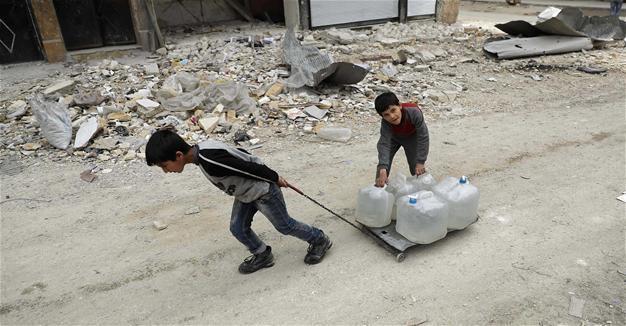New round of Syria peace talks opens in Astana without rebels
ASTANA
 A third round of Russian and Turkey-backed talks on the Syrian war opened in the Kazakh capital Astana on March 14 without armed rebel groups, leaving little hope for a breakthrough in ending the six-year conflict.
A third round of Russian and Turkey-backed talks on the Syrian war opened in the Kazakh capital Astana on March 14 without armed rebel groups, leaving little hope for a breakthrough in ending the six-year conflict.The talks, sponsored by regime allies Russia and Iran and rebel-backer Turkey, come as other diplomatic efforts to end the bloodshed have proved fruitless.
The talks were derailed as rebels boycotted the new round of meetings in Astana and the Kremlin indicated there were international divisions over the process.
Russia, Syrian President Bashar al-Assad’s most powerful ally, said the rebels’ reasons for staying away were unconvincing and their decision came as a surprise. Describing the rebels as Turkish proxies, the Syrian government envoy said Ankara had broken “its commitments” to the Astana process.
The rebels said they would not attend the talks, scheduled for March 14 and March 15, because of what they called Russia’s unwillingness to end air strikes on rebel-held areas and its failure to get the Syrian army and Iranian-backed militia to abide by a cease-fire.
Russia has sought to revive diplomacy over Syria since its air force helped government forces defeat rebel groups in eastern Aleppo in December last year, Assad’s biggest victory of the war.
The cooperation of Turkey, one of the main backers of rebel groups fighting in northern Syria, has been crucial to the Russian diplomatic effort, helping to broker a cease-fire in December after the rebels’ Aleppo defeat.
Two previous rounds of Astana talks have sought to consolidate that cease-fire, reflecting an improvement in Russian-Turkish ties that had been strained to breaking point by the Syrian war.
Russian Foreign Minister Sergei Lavrov said the Russian Defence Ministry was in touch with Syrian rebel leaders who boycotted the talks, the Interfax news agency reported. He said Russia was dealing with the situation.
The Kremlin spokesman described the talks as hugely complex. “Sometimes the situation at these talks is really complicated because of substantial differences in approaches of various countries,” Dmitry Peskov said during a conference call.
Alexander Lavrentiev, the head of the Russian delegation in Astana, told reporters the opposition’s absence was “sad” but there was still “many things to discuss and make decisions about”.
Russian President Vladimir Putin had credited the Kazakhstan talks, which focus on reducing the fighting, with jumpstarting U.N.-led peace talks in Geneva seeking a political settlement to the six-year conflict.
The Geneva talks broke off without any progress as seemingly unbridgeable divisions persist, chiefly over the future of Assad who seems militarily unassailable in the areas of western Syria under government control.
















